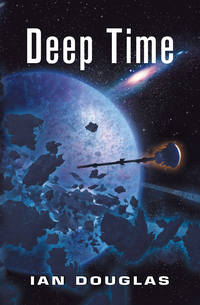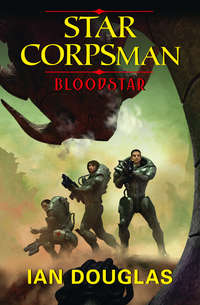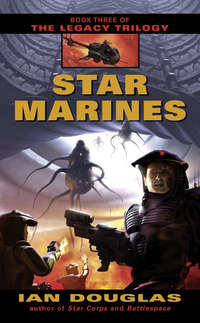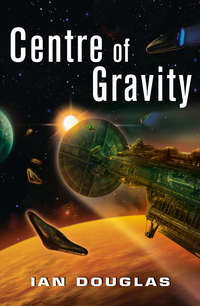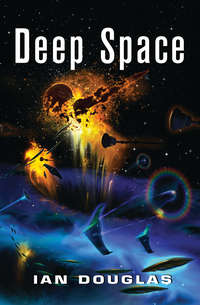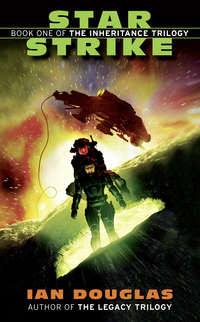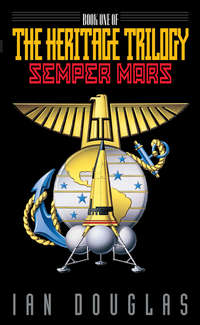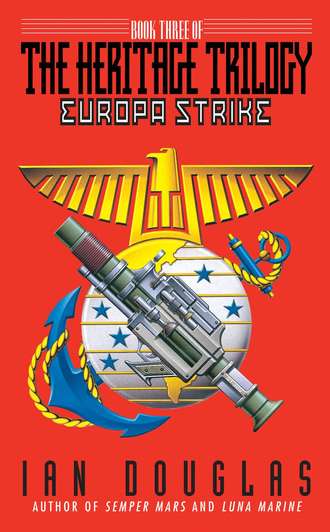
Полная версия
Europa Strike
“Beijing,” he replied, “isn’t exactly known for how well they play with others. Especially barbarians like us.”
He was right, of course. A struggle was shaping up, a struggle that might well determine the nature of humanity for the next ten thousand years.
And Kaitlin and Jack and the rest of the U.S. Marines were going to be at ground zero—the proverbial eye of the storm.
As usual.
Squad Bay
1 MSEF Barracks
2135 hours Zulu
“Bumfuq!” Lucky exploded. “We’re bein’ sent to Bumfuq!”
Bumfuq, Egypt, was an old, old expression current throughout all branches of military service, referring to a place, a duty station so far removed from the civilized amenities that you might as well be on another planet.
Which, in stark, cold point of fact, was exactly where they were going.
“Aw, c’mon, Lucky!” Staff Sergeant BA Campanelli said, laughing. “How bad can it be? Anyway, you always said you wanted to go to space!”
“Shit,” Lance Corporal Dick Wojak said. “He just doesn’t want to lose access to his virtual girlfriends!”
“Hell,” Sergeant Dave Coughlin said. “He should just download one of ’em into his PAD and bring her along! Then we could all share in the wealth!”
“Why don’t you like girls, Luck?” Kelly Owenson said. “Real ones, I mean?”
“I like girls fine!”
What he didn’t like talking about was the fact that virtual relationships just didn’t fucking hurt as much as the real ones. Damn, Becka. Get out of my head….
He took another swallow of the drink BA had mixed for him—a pineapply something that was quite good. What had she called it?
Sergeant Sherman Nodell was weaving a bit in his seat, despite the fact that he outmassed Lucky by a good twenty kilos, and he didn’t seem interested in discussing Lucky’s sex life. “Just give me another one of those…things you were talkin’ about a little bit ago,” he said. He was being very careful how he enunciated his words.
The nine of them, all members of First and Second Platoons, Bravo Company, were sitting at a folding table in the barracks squad bay. The huge and otherwise bare room which had once been an aircraft hangar was decorated with green-painted concrete floor, steel storage lockers, a display case near the entrance with trophies and battalion honors, and a wall-sized flatscreen on one bulkhead that was displaying the Marine Corps emblem at the moment. Normally, they all would have been out tonight, hitting the bars and sensies in Lompoc, but the 1st Marine Space Expeditionary Force had been restricted to the base ever since word had come down of the early deployment to Europa.
Staff Sergeant Campanelli had come to the rescue, though. She’d been a bartender as a civilian—“in a former life,” as she liked to call it—and she occasionally hauled out a small, portable bar-in-a-suitcase that was her prized possession and entertained the others in the platoon with some of her strange and wonderful concoctions. Mixing drinks in a nondesignated area probably violated half a dozen different regs, but she hadn’t been caught yet. There were rumors to the effect that she had been caught, once, but gotten off in exchange for a bottle of scotch.
Her full name was Brenda Allyn Campanelli, so inevitably she’d picked up the handle “BA,” for Bad Ass, even though she claimed her ass was very good. No one in the platoon claimed personal knowledge of that fact, however, though there’d been a great deal of speculation.
“So…what’ll it be, big boy?” she asked Nodell, taunting him.
He leered. “I wanna blow job!”
“Coming right up! But you’ve got to take it the right way!”
“And what way would that be?”
“I’ll show you.”
She began mixing drinks in two shot glasses, half amaretto, half Kahlúa, topped with a generous squirt of whipped cream from a dispenser in the freezer section of her portable bar. “Okay, we really need a low table for this.”
“How about a chair?” Lucky volunteered.
“That’ll do.” She put the drinks on the chair’s seat, then got down on her knees. “You’ve got to do this right!”
Holding her hands behind her back, she bent forward and took one of the loaded shot glasses in her mouth. The other Marines cheered, clapped, and chanted “Go! Go! Go!” as she tipped her head and the glass up and back, draining the liquid and most of the whipped cream into her throat. Snapping her head forward, she returned the empty shot glass to the chair, licked the excess whipped cream from her lips, and held up her hands as the Marines cheered and stomped on the deck.
“And that is how you do a blow job!” she told Nodell.
“All right!” Dave cried, applauding. “You know, we ought to call you ‘BJ,’ not ‘BA’!”
“Hey, I like that! Just don’t go gettin’ any ideas!”
“I always have ideas, Staff Sergeant!”
“Your turn!” Corporal Lissa Cartwright told Nodell.
“Aw, that’s a sissy drink!” he began, but the others began chanting at him.
“Do it! Do it! Do it!”
At last, he awkwardly dropped to his knees, bent over the remaining glass, and took it in his mouth. He didn’t tip his head fast enough, though, and a lot of it ended up dribbling down his chin, together with a small avalanche of whipped cream. He started choking and gagging, and Lucky and Corporal Duane Niemeyer began pounding him on the back.
“Gah!” he said, rising from the floor. “That’s still a sissy drink! I only drink…I only drink…uh…a man’s drink!”
“And what would that be?” BA asked him.
“Hell, just about anything that pours. One at a time or all together, I can take it! I just don’t do sissy drinks.”
“Is that so?” She studied him. “You ever tried a cement mixer?”
“Nah. What is that, another sissy—”
“A man’s drink,” she told him. “With a name like ‘cement mixer,’ what would you expect?”
“Now that sounds more like it! What’s in it?”
“Here, I think I have the ingredients. Yup. You do this in two stages.” Deftly, she poured out two shot glasses, one with lime grenadine, the other with Bailey’s Irish Creme. She handed him the Bailey’s. “Here. Take this…but don’t swallow. Hold it in your mouth.”
He tossed the shot back.
“Now,” she told him, “take this in your mouth and swish it around with the other.”
Lucky had seen this gag pulled before. The lime juice curdled the Bailey’s, turning it to the consistency of cottage cheese. It didn’t taste bad—sort of like sweet tarts, in fact—but the sensation of having that stuff congeal in your mouth out of nowhere generated the most wonderful expressions of disbelief, shock, and dawning I’ve-been-had horror imaginable.
Nodell was just starting to work at it when the far door opened and Major Warhurst walked in.
“Attention on deck!” Dave cried. There was a swift rattling and shuffling as shot glasses and bottles somehow vanished into BJ’s porta-bar, which closed and locked and made it to the floor as the rest of them stood up.
Warhurst didn’t seem to notice—likely a deliberate oversight on his part—but he seemed fascinated by the expression on Nodell’s face. “Carry—” he started to say, and then stopped. “Nodell? Are you okay?”
“Um…mmm-mmm…mmm!” He was working his jaws furiously, trying to swallow the mess in his mouth without parting his lips.
“That’s ‘Mmm-mmm, sir,’ Nodell. What have you got in your mouth?”
Lucky stood at attention, wondering what was going to go down. V-berg wasn’t dry, but the only drinking allowed was at the various designated watering holes, the enlisted bars and NCO clubs and such. They could all be in a world of shit if Major Warhurst decided to be a prick.
With several more vigorous workings of his jaw, Nodell managed to get the congealed mess chewed and swallowed. “Uh, sorry, sir. You caught me with my mouth full.”
“Of what?”
“Uh…my girlfriend sent me some cookies.”
Warhurst glanced at the suspiciously empty table—no wrappings, no crumbs. “I see.” He sniffed. “Lime cookies? Smells good! I don’t suppose you have any for your CO.”
“Uh, sorry, sir. That was the last one!”
“Very well. Carry on, then!”
“Aye, aye, sir!”
“Almost taps, people. You’d better break this up. We start weapons training early tomorrow. M-580, stripping, cleaning, and troubleshooting. You’ll need clear heads.” He gave Nodell a hard look. “All of you!”
He turned and walked out, as the Marines at the table slowly, ever so slowly, relaxed again.
“Jeez! We coulda all been busted!” Lucky said.
“I don’t think so,” BJ said. “He knew!”
“Nah,” Dave said. “No way.”
“So…what kind of skipper is he?” Corporal Mayhew asked. He was the company’s current newbie, newly arrived from Space Training School at Quantico.
“Damned tough,” BJ told him. “So tough I’d follow him to hell.”
And the others agreed. Lucky wasn’t quite that trusting…but was willing to give him the benefit of the doubt. He was willing enough to consider following the guy to hell.
But…to Europa?
23 SEPTEMBER 2067
Tiantan Shandian
Solar Orbit
1412 hours Zulu
They’d been extending the tether for the past thirty hours, allowing the fifteen-kilometer cables to play themselves slowly out into the night. At the far end of the four superconducting cables, a twenty-ton doughnut of steel, ceramics, and titanium used electrostatic forces and tiny rocket motors to maintain tension against the cables as they unspooled from the Heavenly Lightning’s blunt prow. Lasers ensured perfect alignment, while powerful optical and infrared telescopes assured proper tracking and aim.
On the Lightning’s bridge, drifting beside the communications suite, Captain Lin Hu Xiang grasped a handhold and pulled himself alongside the communications officer, head down. “Do we have our final word?”
“Yes, Captain!” The comm officer’s young face betrayed the flush of excitement. “It is confirmed both by Mission Control and the Star Mountain. Jia you!”
Go.
“I can’t help but feel certain…misgivings,” Lin said. “We advance blindly into an unwise war…”
“Sir! The Space Military Directorate would never—”
“It’s not the Directorate I’m worried about. It’s our inspired leaders in the Great Hall of the People. The men who put us here, who decided we should begin a war launched against the entire world.”
The comm officer looked shocked. Evidently, he’d never expected to hear a commanding officer criticize the government. “I…I am sure they have their reasons.”
“No doubt. And urgent ones, I imagine. Still…how is your military history, Lieutenant?”
“I am a graduate of the Beijing Academy, sir. First honors!”
“Which guarantees nothing. Do you know the name Zhu-gang?”
“No, Captain.” He looked puzzled. “Is that a place in the homeland?”
“No. But our actions today will draw inevitable comparisons. I hope our leaders are prepared to accept the consequences.” Turning carefully in midair, he addressed the Lightning’s weapons officer. “Mr. Shu. Are we on target?”
“We are, Captain. Target One is locked in. The computers are programmed to execute a five-degree yaw to bring Target Two to bear, as soon as Packages One and Two have been released.”
“And our little distraction is ready?”
“Ready for launch, Captain.”
He looked at Commander Feng Sun Wa, the Executive Officer. “And the crew?”
“All crew members report themselves strapped in and ready for action.”
“Very well.” There could be no further delay. “Mr. Shu, launch the decoy.”
An eight-ton Zhuongshu missile sped from the Lightning’s launch bay, accelerating in a burst of energy at nearly twenty Gs. Its course took it back along the path traversed by the Lightning, chasing after a bright blue star and its tiny, grayish consort—the Earth and the Moon, now 50 million kilometers distant. Before long, the fast-moving missile had canceled the original velocity imparted by the Lightning away from Earth and begun closing with the distant planet.
Not that Earth was the target. After six minutes, the range between the Lightning and the missile had opened to 20,000 kilometers. A quick targeting check made certain that the missile was precisely aligned between the Lightning and distant Earth, and then the Weapons Officer pressed a key, triggering the detonation sequence over a lasercom link.
The missile’s 100-megaton thermonuclear warhead detonated in a savage, death-silent flash.
“Radio communications with Earth is now interrupted,” the comm office said. “Nothing but static on all channels.”
“Confirm that all hands are strapped in.” Best to double check. This was going to be a rough ride.
“Confirmed, Captain.”
“Very well.” Lin took a deep breath. “Fire main weapon. Package One.”
“Package One, launch at three hundred forty thousand gravities. Fire.”
The Heavenly Lightning lurched as the egg-shaped, ten-kilo mass hurtled down the channel formed by four taut, superconducting cables. Accelerated by a fusion-charged magnetic pulse at an acceleration of 340,000 Gs, it traveled the fifteen-kilometer length of that immense gun barrel in just under a tenth of a second, emerging from the doughnut at the end with a velocity of over 316 kilometers per second. Ten kilos, compared with the Lightning’s 25,000-ton mass, would normally have been insignificant, but hurled into the void at that speed, it imparted a significant recoil to the huge ship. Lin felt the nudge, a hard kick transmitted through the back of his acceleration seat.
Seconds passed as the main weapon powered up for a second pulse…and then Package Two was launched, hurtling after the first. The range to target was just under 525 million kilometers. At 316 kps, the warheads would reach their target in nineteen days.
After a flurry of checks, confirming that both packages were on target, Lin gave the order to execute the five-degree yaw, bringing Target Two under the railgun’s muzzle. It took nearly an hour to adjust the aim—with a “gun barrel” composed of four charged tethers fifteen kilometers long. The cloud of plasma from the detonated nuclear warhead continued to expand, however, effectively screening the Lightning’s actions from any Earth-bound observer. Sensitive detectors in Earth orbit might pick up the EMP surges of the main weapon each time it fired, but they wouldn’t be able to tell what was happening.
With all targeting information again checked and double checked, Captain Lin ordered the main weapon fired again. This time, acceleration was set to one million gravities, and the Force Package flicked clear of the tether railgun with a velocity of 543 kilometers per second. The recoil was significantly greater with this launch, a savage lurch that sent the Lightning drifting backward like a burst from a maneuvering thruster.
That shot was followed by a second…and then a third, at which point an overstressed coolant feed in Lightning’s main fusion reactor melted. The reactor’s core temperature skyrocketed, forcing an automatic scram and shutdown.
No matter. Two packages on Target One, and three on Target Two. It was enough.
Target Two was at a much greater range than Target One—almost 900 million kilometers. With the higher muzzle velocity of the weapons, however, they would reach Two in just nineteen days…within about an hour of the attack on Target One.
Lin gave the order to reel in the tethers and readjust the ship’s orbit after being shoved off course by five high-G railgun shots. Engineering crews began working on the rather serious problem of bringing the main fusion reactor back on line. It scarcely mattered. His orders now were to remain on station, in case further shots were needed, but he doubted that the CWS Peaceforce would give him the luxury of a second try.
He continued to think about Zhugang.
FOUR
11 OCTOBER 2067
U.S.S. Franklin Delano Roosevelt
Entering Jovian System
1417 hours Zulu
Major Jeff Warhurst made his way along the narrow access corridor in zero-G, pulling himself along gently until he reached the hab access collar, which was grinding about the tunnel once every twenty seconds in a thunderous cascade of sound. He picked his target—the slow-moving entryway to “C” Hab—then, grabbing the handholds on either side, he swung his feet up and through the opening with an almost graceful ease borne of three weeks’ practice.
Lowering himself by the hand-and footholds, a feeling of weight gently returned, growing stronger with every meter of his descent. He emerged on “C” Hab’s upper deck, a gray-walled, claustrophobic space crowded with Marines. For three weeks now, “C” Hab had been home to Bravo Company, eighty-one Marine officers and men and one Navy hospital corpsman, living on two crowded berthing decks and one level designated as the squad bay. The air was steamy and thick, stinking of far too many people crowded into too small a space.
“Attention on deck!” someone shouted, and seated Marines began to rise.
Jeff waved them back down with a careless toss of his hand. “As you were!” he bellowed. “Carry on!”
This close to the ship’s hub, the spin gravity was only.21 G; you had to watch your footing and your inertia when you were moving, and the Coriolis effect was particularly unpleasant. This level had some berthing spaces, but most was reserved for offices, crew’s quarters, and a common room that doubled as a mess deck and galley.
It was also the only space in the hab that provided a view of the outside. A two-meter wall screen mounted on the forward bulkhead was set to display various views from cameras mounted on the Roosevelt’s hull.
The view now was forward from the transport’s prow. Jupiter was centered squarely in the screen, a slightly flattened orange disk, its banding easily visible to the naked eye. Although it was hard to tell from an image on a vid monitor, it looked a little larger than the full Moon did from Earth. All four of the Galilean satellites were visible, three on one side of the disk, one on the other. He didn’t know which of those bright-shining points of light was Europa, their destination, but one of them was.
The Roosevelt was 11 million kilometers out from the planet, and well within the orbits of the huge world’s outer moons. They’d just passed the orbit of Leda, a tiny chunk of rock and ice lost in all that night.
Sergeant Major Kaminski was standing by the screen, a squeeze bottle of coffee in his hand. “Major, sir,” he said, nodding. “How went the meeting?”
“As expected, Sergeant Major,” he replied. “We’re to be squared away by sixteen-thirty hours, with inspection at seventeen hundred. Spin-down, turnover, and deceleration are scheduled to begin at twenty-twenty hours. We’ll want to make sure everyone’s had chow and the mess gear’s cleared and stowed before then.”
“Aye, aye, sir. We’ll be four-oh, never fear.”
“Good.” He stared a moment at the vid screen. “Which one’s Europa? You know?”
Kaminski indicated the middle star of the three on the right. “That brightest one, sir.” His finger moved to the moon nearest Jupiter. “This little red one’s Io. You can almost smell the sulfur volcanoes from here.” He indicated the lone moon to the left. “That’s Ganymede. Biggest moon in the Solar System, bigger even than Mercury, and the next out from Europa.” His finger slid back to the right. “And Callisto. Outermost of the Galilean satellites, and enough like our Moon back home to make us all nostalgic for cold beer and a hot date.”
“I didn’t ask for a travelogue, Sergeant Major.”
“No, sir. Of course not. Sir.”
Oh, stop being a prick, he told himself savagely. “Sorry, Kaminski. I guess I’m a little on edge.”
“Goes with the territory, sir.”
Damn. Kaminski was always so diplomatic. Always knew exactly what to say. Well, that went with the territory too. Frank Kaminski had been in a long time…almost thirty years. He’d been in during the UN War, a veteran of Garroway’s March, of Tsiolkovsky, of half a dozen nasty little actions fought as the old UN broke up and the new CWS began to take shape. He was supremely competent at everything he did, the quintessential Marine’s Marine. His little spiel on the Galilean satellites was typical. The man always researched the next duty station or deployment, and seemed to command an inexhaustible armory of facts about the place—facts always tempered by long, personal experience.
Jeff touched one of the keys on the vid display, and a computer-generated image of the Roosevelt appeared center-screen, showing the transport’s current attitude. She was an impressive vessel, 200 meters long from the blunt, water-tank prow ahead of the stately pirouette of her hab modules to the massive ugliness of her A-M plasma drives safely far astern. Still, at that resolution she looked damned small adrift in so much emptiness.
The single most revolutionary advance in spacecraft propulsion during the mid-twenty-first century was the steady-thrust antimatter engine, or A-M drive. Developed in parallel during the UN War by both the U.S.-Japanese Alliance and by the European Space Agency, A-M drives transformed space travel within the Solar System from long, lazy, energy-saving Holmann transfer orbits to relatively simple, straight-line, point-and-shoot affairs. Antimatter enthusiastically converted itself plus the equivalent of its own mass in ordinary matter into raw energy and plasma with a very high specific impulse…meaning high efficiency. By mixing matter and antimatter in a one-to-one ratio, a few tons of fuel was enough to take a ship, boosting steadily at one G for half the distance, then flipping over and decelerating for the second half, all the way to Jupiter in a matter of days.
Unfortunately, antimatter was tremendously expensive to produce. Enormous solar-power facilities at L-3 and on the Moon were used to transform sunlight into energy, which in turn was used to create and accumulate antimatter in microgram amounts, using techniques unchanged in principle since the late twentieth century. Because of the expense, most A-M spacecraft employed either conventional fuels “heated” by the insertion of very small amounts of antimatter to increase their Isp, or plasma thrust engines that used a little antimatter to turn a lot of reaction mass—usually water—into plasma, but at much lower thrust-to-weight efficiencies. Spacecraft like the Franklin Delano Roosevelt and the other big A-M cruisers could employ steady-thrust acceleration at one G and reach Jupiter space in a week, but since doing so would consume the entire antimatter output of the U.S. A-M facility at L-3 for the past thirty months, simple economics required a more conservative approach.
Instead of hammering away at One G for the entire trip, the Roosevelt boosted at one G for just twelve hours out of Earth orbit, achieving in that time a velocity of just over 420 kilometers per second. She then coasted for the next twenty-four days, slowing steadily under the gravitational drag from the Sun, but still crossing 900 million kilometers of empty space in twenty-four days rather than years.
But Marines, being Marines, grumbled. They all knew the voyage out could have taken a mere seven days. Instead, they were crowded aboard the transport for over three weeks during the claustrophobic passage to Europa. During her twenty-four-day coast, the Roosey provided a semblance of gravity by rotating the hab modules. Her four boxlike habs spanned sixty meters; by rotating them about the ship’s axis three times per minute, a spin gravity of.3 G was maintained in the lowest decks of each module, with lower gravities on each deck going up toward the axis. The idea was to give the Marines a compromise between acclimating to Europa’s surface gravity of.13 G and letting them maintain muscle tone and general fitness.
In fact, so far as Jeff Warhurst was concerned, three weeks at.3 G was just enough to make the coast phase of the voyage completely miserable. The queasy sensations of Coriolis forces affected everyone’s inner ears, and half of his company was affected by space motion syndrome—“space sickness,” to the layman. The passenger quarters—the “grunt lockers,” as they were called—were jam-packed with humanity sleeping in racks stacked six high and using the common rooms/mess decks, the tiny shower cubicles, and the heads on rotating schedules. A single one of the Roosevelt’s four hab modules could modestly quarter thirty people on three decks; this trip out, the Roosey carried a complete Marine Landing Force—two companies, Bravo and Charlie, plus a recon platoon, headquarters and medical element, and the twelve-man Navy SEAL platoon who’d shipped out with them to run the Manta subs—280 men and women in all, plus the ship’s usual Navy complement of fifteen.


